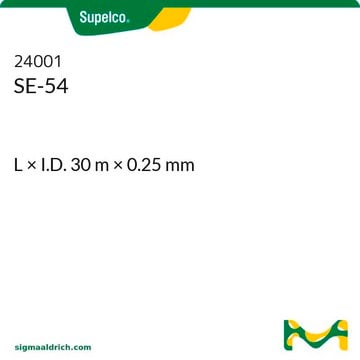28476-U
SLB®-5ms Capillary GC Column
L × I.D. 30 m × 0.25 mm, df 1.00 μm
Synonym(s):
GC column, SPB-5, 5% diphenyl, mass spec
About This Item
Recommended Products
material
fused silica
Agency
Standard Method 6040D
EN 2005/108/EC
EPA 610,625,8015,8082,8100,8141,8270,OLM04.2 SVOA
EPA TO-13,IP-8,8270,525.2,608.1/608.2,608/8081/OLM04.2 PEST
JMHLW
NIOSH 2530,5503
OSHA 62
meets requirements for USP G27 and G36
suitable for EPA 1613
reg. compliance
FDA LIB 4423
parameter
-60-340 °C temperature (isothermal)
-60-360 °C temperature (programmed)
Beta value
63
df
1.00 μm
technique(s)
GC/MS: suitable
gas chromatography (GC): suitable
L × I.D.
30 m × 0.25 mm
matrix active group
Bonded and highly crosslinked; silphenylene polymer virtually equivalent in polarity to poly(5% diphenyl/95% dimethyl siloxane) phase
application(s)
agriculture
chemicals and industrial polymers
cleaning products
clinical
cosmetics
environmental
flavors and fragrances
food and beverages
forensics and toxicology
industrial hygiene
life science and biopharma
personal care
petroleum
pharmaceutical (small molecule)
column type
capillary non-polar
Looking for similar products? Visit Product Comparison Guide
Related Categories
General description
USP Code: This column meets USP G27 and G36 requirements.
Phase:
- Bonded and highly crosslinked
- Silphenylene polymer virtually equivalent in polarity to poly(5% diphenyl/95% dimethyl siloxane)
- ≤0.32 mm I.D.: -60 °C to 340 °C (isothermal) or 360 °C (programmed)
- ≥0.53 mm I.D.: -60 °C to 330 °C (isothermal) or 340 °C (programmed)
Other Notes
Legal Information
Choose from one of the most recent versions:
Already Own This Product?
Find documentation for the products that you have recently purchased in the Document Library.
Articles
Sigma-Aldrich presents an article about the analysis of melamine and related compounds in dog food with the use of more economical gas chromatography-mass spectrometry (GC-MS) instrumentation.
Protocols
-Xylene 1000 μg/mL; 1,2,4-Trimethylbenzene 1000 μg/mL
There are three types of analyses: GRO, DRO, and TPH. The published methods are simply variations of these to meet the different analytical needs of the individual agencies.
Related Content
This page is intended to make it easier to find the consumables you need based on the analytical method you’re using. Methods included on this page come from the EPA, Standard Methods and ASTM.
Chromatograms
suitable for GCsuitable for GCsuitable for GCsuitable for GCOur team of scientists has experience in all areas of research including Life Science, Material Science, Chemical Synthesis, Chromatography, Analytical and many others.
Contact Technical Service






